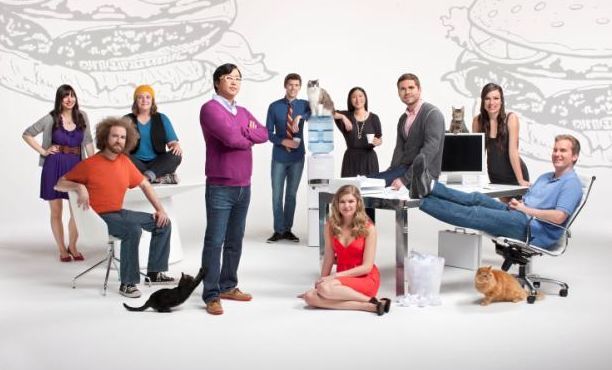Private vs. public education
Sep 5, 2010, 6:49 PM | Updated: Mar 28, 2011, 3:46 pm
 The lawn is meticulously manicured, as if the groundskeeper’s tools include a cuticle scissors. Classic brick buildings, a bell tolling the hour and concrete lion statues almost convince me that I’m at an East Coast college. But this is Lakeside School in Northeast Seattle.
The lawn is meticulously manicured, as if the groundskeeper’s tools include a cuticle scissors. Classic brick buildings, a bell tolling the hour and concrete lion statues almost convince me that I’m at an East Coast college. But this is Lakeside School in Northeast Seattle.
This is where super-achievers went to school – Bill Gates, Paul Allen and Craig McCaw to name a few. Many of Seattle’s affluent families send their kids here for a challenging private education. With an acceptance rate of 24 percent, Lakeside is the most elite private high school in the Northwest. This photo of Bliss Hall was taken before the current renovation project started.
So what was I doing there? Just wandering, and wondering if my children would have a better start in life if they went to private schools.
“As someone who has experienced both public schooling and private schooling, there is absolutely no doubt in my mind: sending your child to a private school is one of the best decisions you can make for him or her,†says Peter Rasmussen, a recent Lakeside alumnus. “In retrospect, if my parents made me pay my tuition all by myself, I would have. That’s how valuable a Lakeside education is.â€
Words from an e-mail conversation with Rasmussen scroll across my brain as I glance around Lakeside: “Absolutely no doubt … one of the best decisions … that’s how valuable.â€
A lot of families are like the Rasmussens. In Seattle, almost one out of four students attends private schools, according to an estimate from Seattle Public Schools. The national average is one in 10.
I’ve talked with the president of Seattle Preparatory School, the mom of a Holy Names Academy student, researchers at the Center on Education Policy and a local education author. They’ve given me a better understanding of why private education is extraordinary and also what public schools do well. Which is better for my kids? For your kids?
Motivated to Learn
 A couple of years ago Peter Rasmussen was preparing a speech for his commencement at Lakeside. Now he’s wrapped up a few years of studying international relations and Spanish at Emory University in Atlanta.
A couple of years ago Peter Rasmussen was preparing a speech for his commencement at Lakeside. Now he’s wrapped up a few years of studying international relations and Spanish at Emory University in Atlanta.
He has all the characteristics I’d expect from a Lakeside grad. He’s intelligent, articulate and ambitious. Rasmussen is so driven that he asked his parents if he could switch from public school to Lakeside when he was in eighth grade.
Rasmussen was unhappy with the quality of teaching at Islander Middle School on Mercer Island. While there were several teachers who were “fantastic,†he says there were “many more who were either mediocre teachers or good teachers who were overwhelmed with too many students and too few resources.â€
Another reason for his dissatisfaction with public education is the same frustration I feel when my middle school-age daughter tells me about her day. Only Rasmussen puts it more politely than I would. There are a lot of students who aren’t “motivated to be sitting in a classroom,†he says.
“Teachers spent copious amounts of time dealing with these kids, while somewhat neglecting the rest of us,†he says. “I wanted to be in an environment where nearly everyone was motivated to learn like I was. I wanted to be in a place where I could learn as much from my peers as I could learn from teachers.â€
The transition from a public middle school to Lakeside was good for Rasmussen, but not as natural for his parents. Some of their friends treated them differently, he says, and made them feel like traitors or snobs for betraying the public school system. People aggressively questioned his decision to switch to a private school.
I understand why adults might be uncomfortable with his choice. It forces them to confront their beliefs about education, and it highlights the fact that private schools have an academic rigor that a lot of us would like for our children, but often don’t find in public schools.
The Golden Ticket
If Seattle Public Schools had a parent pep squad, Lisa Dennison would be on it. She’s been a paid tutor for the district and volunteers to make public schools better for all kids.
Nevertheless, her daughter, Sarah, switched from Whitman Middle School in Seattle to Holy Names Academy on Capitol Hill a few years ago. Dennison says they were put off by a “lack of focus, concentration and rigor†in the public school classroom. Or as Sarah described it, “It was a waste of time.â€
Through a series of chance encounters, Sarah applied to Holy Names, and she received the “golden ticket†– mom’s term for the acceptance letter – her freshman year.
Established in 1880, Holy Names is the oldest continually operating school in Washington state. Like most private schools, it has small class sizes. The student-teacher ratio at Holy Names is 14:1 (Lakeside’s is 9:1).
As I walked through Holy Names, trying to keep my heels from clicking loudly on the gleaming hardwood floors, what stood out wasn’t an external feature or an admissions brochure fact. It was the girls’ confidence and poise. Dennison noticed that, too.
“A lot of times a girl’s self-confidence gets obliterated in middle school and/or high school. Many girls feel like they have to hold back what they know or what they think because they might be perceived as being too smart,†she says. “The young women at Holy Names have a strong sense of who they are. They’re leaders.â€
There are two other strengths of private schools, and in this case a Catholic institution, that Dennison appreciates. They emphasize social justice and community service, and their teaching doesn’t revolve around standardized tests.
Private Is Not for Everyone
For all its plusses, there are a few minuses to private education. It’s expensive. In the Seattle area, high school tuition ranges from $10,000 to more than $25,000, depending on the institution. Also, private schools generally have a homogeneous student body.
Those detractions had Dennison’s daughter thinking about attending Ballard High School. The academic challenges might not be as formidable at Ballard, but she would be around a more diverse group of students and friends from her neighborhood.
“Holy Names has an excellent reputation and will open doors to any college Sarah wants to get into, but it’s not as diverse as we’d like,†Dennison says. “Some families at the school have a sense of entitlement and privilege that is hard for us to deal with. It’s not who we are.â€
Entitled, privileged, elite, white. Those words are sometimes used to describe private schools. Peter Rasmussen says when it comes to Lakeside, that impression is “just nonsense†and it’s an “egregious myth†that the school is racist.
The facts support Rasmussen’s experience. About 42 percent of Lakeside’s students are non-white. Earlier this year a federal judge dismissed the racial discrimination claims made by one of two African-American teachers suing Lakeside. And as for the concern that Lakeside is just for rich kids – about one out of four students there receives financial aid.
Money should not be a deciding factor when choosing a school, according to Seattle Prep President Kent Hickey. Financial aid and scholarships are “there for the asking,†he says. Ultimately, they’d like to have a large enough endowment so the school could be tuition free. Seattle Prep’s goal is to make sure that any student who desires a Jesuit education can receive one.
“Whatever the cost, it’s worth it. Over their four years here, students become independent learners. They understand how to learn and become critical thinkers,†Hickey says. “The immediate goal is knowledge, but the ultimate goal is wisdom.â€
What price would you pay to know your kids are going to be critical thinkers when they graduate from high school and life-long learners afterward?
The Bottom Line
Just as I consider writing a big check for tuition, I examine research which surprisingly does not give private schools an edge. The two most recent national studies on the subject found no evidence that private schools increase student academic performance.
A 2006 Education Department report found that children in public schools generally performed as well or better in reading and mathematics than comparable children in private schools. The exception was in eighth-grade reading, where the private school kids scored higher. The report compared test scores from 7,000 public schools and about 530 private schools nationwide.
The Center on Education Policy (CEP) came out with a more recent report called, “Are Private High Schools Better Academically Than Public High Schools?â€
Their study shows that students attending private high schools performed no better on achievement tests in math, reading, science and history than students at traditional public high schools. The CEP also found young adults who went to private schools were “no more likely to enjoy job satisfaction or to be engaged in civic activities at age 26†than those who went to public schools.
One exception from the report was Jesuit schools, where students performed at a higher level than both public school and non-Jesuit private school students.
Public or private? Maybe there’s a way to have the best of both.
Get a Private Quality Education in a Public School
“You can give your child a public education without feeling like you’re giving them the short end of the stick,†says Cynthia Tobias, an educator and author based in Puyallup.
Tobias has written nine books, including her most recent, I Hate School: How to Help Your Child Love Learning.
She says the way to get a private quality education in public school is to put the responsibility for learning on the student – not the school, not the teacher. A school might be inept, a teacher might be boring, but it’s still the student’s responsibility to get something out of it.
“Even if students have an educator who bends over backwards to motivate and encourage them, they might never get a wonderful teacher like that again, and certainly nobody stands on their head to motivate them after they graduate,†Tobias says. “The key to great education lies within the students themselves.â€
She encourages parents to help their kids figure out their strengths and learning styles. Here’s her Web site and another local site to get started: www.applest.com and www.lifesceneinvestigation.com.
“Private schools don’t have an exclusive right to teach the skills that help kids become curious, engaged learners throughout their lives,†says Tobias. “No matter where they are, no matter what their circumstances, all students can be critical thinkers.â€
This story originally appeared in Seattle’s Child magazine in 2008. Two years later, I’m committed to public schools but still occasionally wonder if my kids would be better off with a private education. If you have school-age kids I’d love to know your thoughts about public and private schools.












